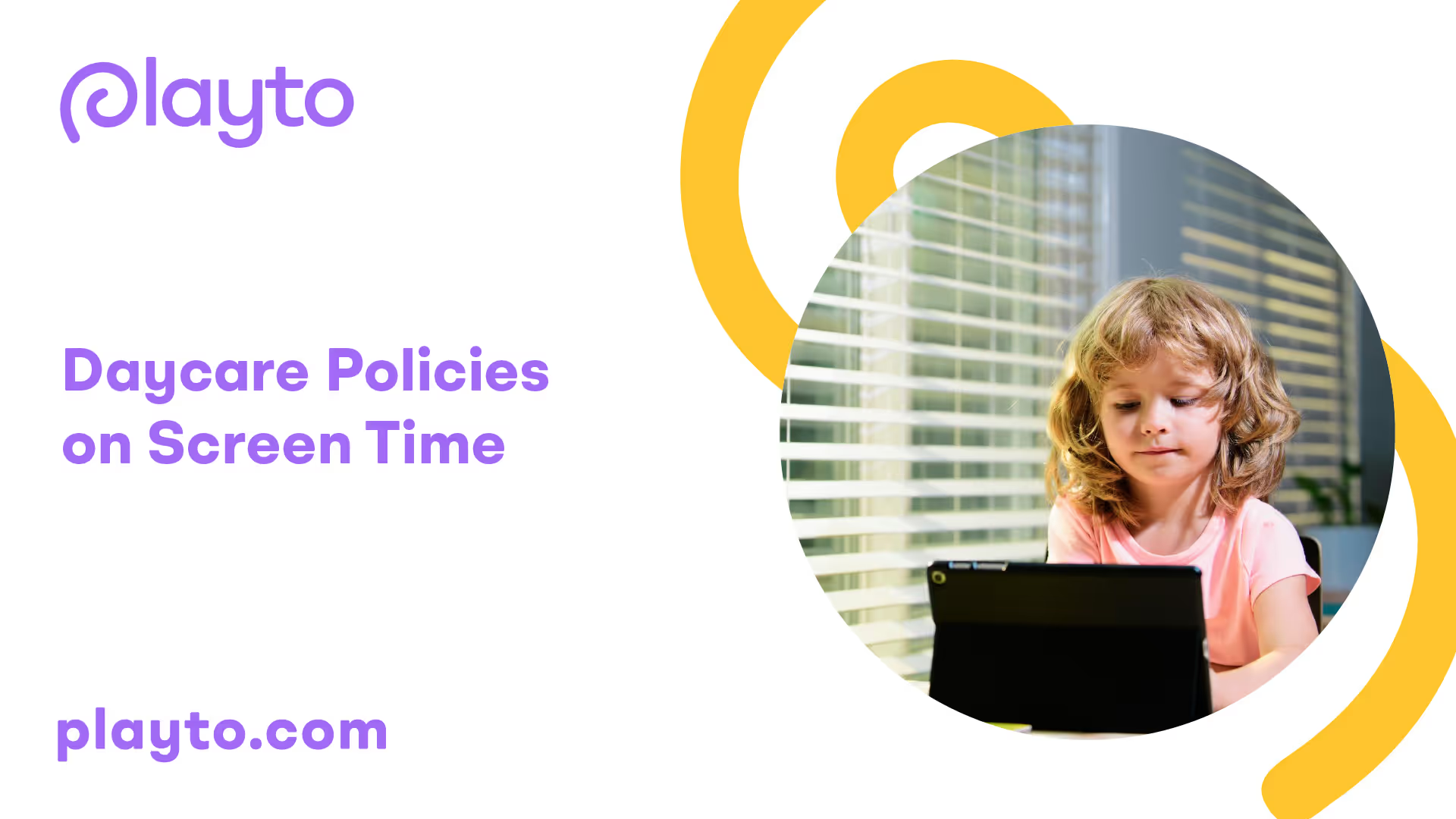Screen Time Policies in Daycares
In daycares, implementing appropriate screen time policies is essential for the well-being and development of young children. These policies aim to strike a balance between the benefits and potential drawbacks of screen time. This section will explore the importance of screen time policies and the impact of supervised screen time in daycare settings.

Importance of Screen Time Policies
Screen time policies play a crucial role in guiding the use of electronic devices and promoting healthy habits among children in daycare. These policies help establish clear guidelines for both caregivers and parents, ensuring that screen time is used effectively and responsibly.
By having well-defined policies, daycares can ensure that screen time is used as a tool for educational purposes rather than excessive entertainment. This helps children develop important skills and knowledge while minimizing the potential negative effects of excessive screen time.
Impact of Supervised Screen Time
Supervised screen time can have positive effects when used appropriately in daycare settings. When screen time is limited and integrated within the curriculum, it can enhance educational experiences and engage children in interactive learning activities.
According to studies conducted in early care and education (ECE) centers in the United States, limited and supervised screen time is associated with higher levels of total physical activity (TPA) and lower sedentary time among children. When screen content is educational and integrated within the curriculum, it can contribute to children's physical activity levels and reduce sedentary behavior.
Daycares that implement screen time policies focused on educational content and restricted computer usage tend to have children who are more physically active and spend less time being sedentary. These findings highlight the importance of monitoring screen usage and ensuring that the content aligns with the educational goals of the daycare.
By incorporating supervised screen time into daycare activities and implementing policies that prioritize educational content, daycares can harness the potential benefits of technology while maintaining a balance with other activities and promoting healthy screen time habits.
As daycares develop their screen time policies, it is important to consider factors such as the duration of screen time, the types of content allowed, and the integration of screen time into the overall curriculum. By setting clear guidelines and monitoring screen usage, daycares can create an environment that supports children's learning and development while minimizing the potential negative effects of excessive screen time.
Next, we will explore specific screen time guidelines that can help daycares strike the right balance between screen time and other activities.
Screen Time Guidelines
When it comes to screen time in daycare settings, it's important to establish clear guidelines that promote a healthy balance between educational screen time and other activities. By providing appropriate recommendations and balancing screen time with physical activity, daycares can support children's development and well-being.

Recommendations for Educational Screen Time
Educational screen time can play a valuable role in children's learning and development. When implementing screen time policies, it's important to consider the following recommendations:
- Limited and supervised screen time: It is recommended to limit screen time for children in daycare settings and ensure it is supervised. This allows educators to guide children's interactions and ensure that screen time is used for educational purposes.
- Age-appropriate content: Select screen-based activities that are suitable for the children's age and developmental stage. Age-appropriate content can engage children and facilitate learning.
- Interactive and engaging activities: Choose screen-based activities that encourage active participation and engagement. Interactive educational apps, videos, or games can promote learning and interaction.
- Integration with curriculum: Integrate screen time activities into the curriculum to reinforce and enhance learning experiences. This ensures that screen time is purposeful and aligned with educational goals.
By following these recommendations, daycares can provide children with valuable educational experiences while keeping screen time within appropriate limits.
Balancing Screen Time with Physical Activity
While educational screen time can be beneficial, it's vital to balance it with physical activity to promote overall health and well-being. Consider the following strategies:
- Scheduled physical activity breaks: Incorporate regular breaks for physical activity throughout the day. These breaks can include active play, outdoor exploration, or structured exercises.
- Active screen time: Whenever possible, encourage children to engage in physical activity while using screens. This can include interactive games that require movement or exercises that are integrated with screen-based activities.
- Variety of activities: Provide a range of activities that promote physical movement and engagement. This can include dancing, yoga, or outdoor play, which help children develop their gross motor skills and stay active.
- Outdoor playtime: Allocate ample time for outdoor play, as it offers numerous benefits for children's physical, cognitive, and social development. Outdoor playtime should be encouraged as an alternative to screen time.
By prioritizing physical activity and incorporating it into the daily routine, daycares can ensure that children have a well-rounded experience that balances educational screen time with healthy movement and play.
Research suggests that limited and supervised screen time, especially when integrated with educational content, can have positive effects on children's physical activity levels and reduce sedentary time in daycare settings [1]. On the other hand, excessive screen time can interfere with physical activity, learning, and healthy lifestyle habits [2]. By implementing screen time guidelines that prioritize educational content and balance it with physical activity, daycares can create an environment that supports children's holistic development.
Effects of Excessive Screen Time
Excessive screen time can have significant impacts on children's behavior and cognitive development. It is important for daycare policies to address these effects and provide guidelines for managing screen time appropriately.

Behavioral Impacts of High Screen Time
Research has shown that high levels of screen time, defined as more than 2 to 3 hours per day on any device, can be associated with behavioral issues in preschoolers. Children who spend excessive time in front of screens, especially when viewing alone, may exhibit greater emotional lability and lower self-regulation [3]. It is important to note that these effects are more likely to occur when screen time exceeds recommended limits.
Cognitive Development Concerns
High exposure to background TV has been found to have negative effects on language use and acquisition, cognitive development, and foundational executive function skills in children under 5 years old. This exposure can reduce the amount and quality of parent-child interaction, distract children from play, and hinder cognitive development [3]. It is important for daycare policies to address these cognitive concerns and provide strategies for promoting healthy development.
To mitigate the negative effects of excessive screen time, daycare policies should consider the following recommendations:
- Set limits: Establish clear limits on screen time duration and frequency for children in daycare. This can help ensure that children have a balanced schedule that includes other activities, such as physical play, reading, and social interactions.
- Encourage active engagement: Emphasize the importance of interactive and educational screen time. Encourage the use of age-appropriate apps, programs, or websites that promote learning and engagement.
- Promote parental involvement: Encourage parents to be involved in their child's screen time activities. Provide resources and information to parents on how to select appropriate content and engage in co-viewing experiences.
- Incorporate alternative activities: Ensure that daycare programs offer a variety of activities that promote physical play, social interactions, and cognitive development. This can help children develop a well-rounded set of skills and reduce their reliance on screens.
Daycare policies play a crucial role in managing and minimizing the negative effects of excessive screen time. By implementing guidelines that prioritize healthy development and provide alternatives to screen-based activities, daycares can create an environment that fosters optimal growth and well-being for children.
Implementing Screen Time Policies
To ensure a healthy and balanced environment for children, it's essential for daycares to implement effective screen time policies. These policies play a crucial role in regulating and monitoring children's screen time activities. Let's explore two key aspects of implementing screen time policies: writing effective policies and establishing monitoring and enforcement strategies.
Writing Effective Screen Time Policies
When crafting screen time policies for daycares, it's important to consider current research and best practices. Effective policies should aim to strike a balance between allowing educational screen time and promoting other developmentally appropriate activities. Some key considerations for writing effective screen time policies include:
- Age-appropriate guidelines: Different age groups have varying screen time needs and capabilities. It's important to tailor the policy to address the specific needs of each age group. For example, the Louisiana child care centers' policy prohibits screen time for children under two years old and limits it to no more than two hours per day for children aged two and above, as recommended by Well-Ahead Louisiana.
- Educational focus: Emphasize the importance of using screens for educational purposes. Research has shown that screen time can have educational benefits when used appropriately. Encourage the use of high-quality educational content and interactive programs that promote learning and development.
- Limited recreational screen time: Set clear boundaries on recreational screen time to ensure that it does not become excessive. Encourage children to engage in other activities that promote physical, social, and creative development.
- Collaboration with parents: Involve parents in the development of screen time policies. Seek their input and provide them with guidelines that they can follow at home to maintain consistency.
Monitoring and Enforcement Strategies
Implementing screen time policies requires consistent monitoring and enforcement to ensure compliance. Some strategies to consider include:
- Staff supervision: Designate staff members to supervise children during screen time activities. This helps ensure that children are engaging in appropriate content and adhering to the established time limits.
- Regular check-ins: Conduct regular check-ins to assess children's screen time usage and ensure compliance with the policy. This can be done through direct observation, informal conversations with children, and communication with parents.
- Collaboration with parents: Maintain open lines of communication with parents regarding screen time usage. Share information on the daycare's screen time policies and seek feedback on children's screen time habits at home.
- Documentation and reporting: Keep records of children's screen time activities to track their usage and identify any concerns. This documentation can help identify trends, evaluate the effectiveness of the policy, and address any issues that may arise.
By implementing effective screen time policies and establishing monitoring and enforcement strategies, daycares can create a balanced environment that promotes healthy development for children. It's important to stay informed about current research and best practices to ensure that policies are up to date and aligned with the needs of the children in your care. For more information on daycare policies, you may refer to our articles on daycare illness policies: when to keep your child home, daycare hygiene practices and policies, daycare policies on personal belongings and toys, and daycare policies on medication administration.
Research Insights on Screen Time
Understanding the relationship between screen time and various aspects of child development is crucial when establishing daycare policies. In this section, we will explore two key research insights regarding screen time: the relationship between screen time and physical activity, and the impact of screen time on language development.
Relationship Between Screen Time and Physical Activity
Research suggests that the amount and nature of screen time can have an impact on children's physical activity levels. Studies conducted in early care and education (ECE) centers in the United States have found that more limited and supervised screen time is associated with higher total physical activity (TPA) and lower sedentary time among children.
Further investigation shows that limited and supervised screen time, particularly when access to computers is restricted and the screen content is educational and integrated within the curriculum, is related to higher levels of moderate-to-vigorous physical activity (MVPA) and reduced sedentary time. In contrast, excessive screen time, especially involving non-educational content, is associated with decreased physical activity levels.
To promote physical activity among children, it is important for daycare policies to limit screen time and encourage engagement in other active play opportunities. By prioritizing outdoor play, structured physical activities, and interactive games, daycare centers can help children develop healthy habits and maintain an active lifestyle.
Impact of Screen Time on Language Development
Screen time can also have implications for language development in young children. While some educational content can support language skills, excessive screen time may have negative effects on language development.
To optimize language development, daycare policies should prioritize interactive and language-rich activities instead of passive screen time. Encouraging activities that involve storytelling, conversation, and play-based learning can foster language skills and provide a more engaging learning experience for children.
By understanding the research insights on screen time, daycare centers can develop effective policies that balance the use of technology with the promotion of physical activity and language development. It is important to limit screen time, ensure that the content is educational and integrated within the curriculum, and provide ample opportunities for children to engage in active play and language-rich activities. For more information on daycare policies, check out our articles on daycare illness policies: when to keep your child home, daycare hygiene practices and policies, daycare policies on personal belongings and toys, and daycare policies on medication administration.
Best Practices in Daycare Policies
When it comes to screen time in daycare settings, implementing effective policies is crucial to promote a healthy and balanced environment for children. Here are two key aspects that daycare policies should consider: screen time restrictions and promoting healthy screen time habits.
Screen Time Restrictions in Daycares
Daycare policies should include clear guidelines on screen time restrictions. It is important to limit excessive screen time and ensure that it does not replace other important activities such as physical play, social interactions, and imaginative play. By setting reasonable limits, daycare centers can create an environment that supports the overall well-being and development of children.
The Canadian Paediatric Society recommends avoiding screen time for children under the age of 2 and limiting screen time to a maximum of 1 hour per day for children aged 2 to 5 [3]. These guidelines can serve as a reference for daycare policies, but it's important for each daycare to establish their own specific guidelines based on the needs of the children in their care.
Promoting Healthy Screen Time Habits
In addition to setting restrictions, daycare policies should focus on promoting healthy screen time habits. This includes ensuring that screen time is educational and integrated within the curriculum. By incorporating screen time into educational activities, children can benefit from interactive and engaging learning experiences.
Daycare policies should also emphasize the importance of balancing screen time with physical activity. Research has shown that more limited and supervised screen time is associated with higher levels of physical activity and reduced sedentary time in children attending early care and education centers. Encouraging active play, outdoor activities, and providing opportunities for movement throughout the day can help offset the sedentary nature of screen time.
It is essential for daycare providers to engage in ongoing communication with parents regarding screen time practices. By working collaboratively, parents and daycare providers can ensure consistency in screen time guidelines and reinforce healthy habits both at daycare and at home. Open and transparent communication channels can also address any concerns or questions parents may have regarding screen time policies.
By implementing screen time restrictions and promoting healthy screen time habits, daycare policies can contribute to the overall well-being and development of children. Limiting screen time allows children to engage in more physical activities, social interactions, and imaginative play, which are crucial for their cognitive and emotional development. It also helps children discover new hobbies, develop creative skills, and improve problem-solving abilities.
For guidelines on other important daycare policies, be sure to check out our articles on daycare illness policies: when to keep your child home, daycare hygiene practices and policies, daycare policies on personal belongings and toys, and daycare policies on medication administration.
